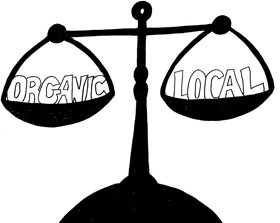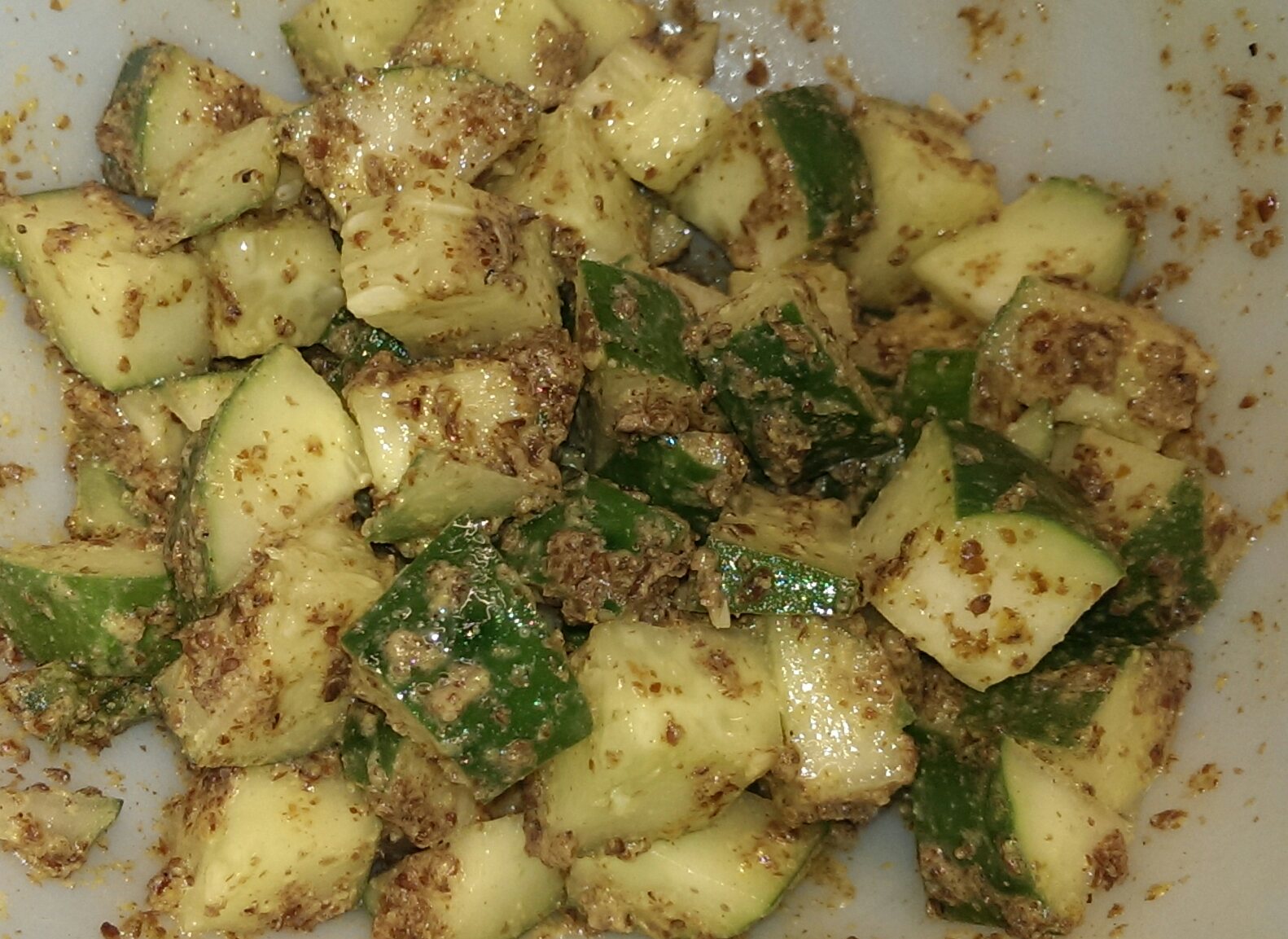Cucumbers – Breakfast of Champions
Personal experience between local and organic fruit
My wonderful summer of cucumbers
Before jumping into the cucumber patch, of late I have been involved in the experiential debate of locally grown versus organically grown fruit. Just the other day on Rt 258 I got an amazing array of white donut peaches and white nectarines. They were extremely juicy and just dripping with flavor and freshness.
In contrast, I also had a commercially grown box of organic peaches that were picked early and shipped in from some faraway place – and they basically tasted like cardboard. Could not find one drop of juiciness in them and they only carried the faint taste of a peach. Surely, somewhere, someone is growing incredible organic peaches, but in my own experience on this occasion the outcome of the debate between local and organic was pretty clear.
Note: Another unsavory aspect of commercially grown organic fruit is that almost cent-per-cent of the time it is coated in wax, or oil, or resin so that it will have a longer shelf-life. Those agents also fall within the landscape of “certified organic”, but who wants to ingest all that stuff. One option of course is to peel the fruit, but that is not ideal in my mind and a whole other converation.
Now on to those cucumbers which I have been enjoying so much this summer thanks to my sponsors named below who provided me with tasty, fresh, and crunchy cucumbers – which I often ate “as is”. They were that good.
According to the yogis, and perhaps others as well, cucumbers are a food best suited for eating in the morning hours – say by noon or so. Can never forget eating these incredibly huge, long cucumbers while living in a mud hut on a remote banana planatation in South India. Every morning we would cut a cucumber in quarters lengthwise and eat these long wedges of cucumbers. At the outset, your arm would be fully extended just to hold them! Tasty times…
Another quality of the cucumber is that it is a cooling food – that’s to say it has a cooling effect on the body. Just as various spicy peppers have a heating effect on the body, there are cooling foods, one of which is the cucumber. Other cooling foods are bananas and oranges. For me, oranges have a very dramatic cooling effect that is very noticeable.
So, as I was saying, I have been fortunate to have had a lot of fresh, locally grown cucmbers this summer.
Though, as we all know, often the quandary with cucumbers is – well, how to eat them. They are not like green squash or other vegetables which you might cook several of with an evening meal. Generally, cucumbers are eaten raw and in relatively small quanities – perhaps a slice or two here and there. And while I ate many “as is”, and they were tasty and refreshing, I also began thinking of other ways to eat all these wonderful cucumbers.
Being the resourceful fellow that I am, it never occured to me to Google some type of cucumber sauce, or drink, or salad – or any other recipe. Just I relied purely on my own, homespun technique. And here it is – shown below – followed by the secret “recipe.” By this way I readily and happily ate many, many cucumbers.
As you can see, all that I would do is dice up the cucumber and then liberally add my secret sauce. So what is the secret sauce you ask? Here it is: Freshly ground organic flax seed (plenty), nutritional yeast (plenty), a touch of diced fresh jalapeno pepper (which was also locally grown), black pepper, dash of salt, a splash or two of organic apple cider vinegar, and olive oil (modest amount). It was fast, easy, and tasty! And yes on some days tomatoes and red peppers did make it into the mix – but mostly it was just those cucumbers. And I have to say, all that sauce would have been for naught if the cucumbers themselves were not so wonderful. No wax or polish or plastic feel – just picked fresh out of the earth.
Thanks Tina (cucumbers & jalapeno peppers), Janet (cucumbers & green squash), and Leslie (cucumbers) for all the great bounty this summer…which I know were grown with maximum love, water, and sunshine. So these were the best of both worlds – local and organic.




thanks for the nod–we practice our own version of gardening. It’s called “neglect” and “we got busy.” April is the month of motivation: we turn the soil, work in the compost, plant and walk away. then we get distracted…Mother nature does her thing. I’m not messing with that formula….
Sounds like you have it down to an absolute science!!
I’ll attest to it…
Hi Satyam,
I share your quandary of local versus organic, especially when it comes to peaches! We picked up a couple dozen local peaches from the farm stand near the 2/4 split. They were amazingly juicy and flavorful! However, these peaches did not have the occasional worm living in the pit that I am used to.
The local sweet corn has also been a delicious treat this summer, too! But no worms living amongst the silk! This delicious local produce was clearly treated with pesticide.
My father used to tell me when I screamed and threw my wormy apple, peach or ear of corn, “Dont worry! The worms are a sign that it must be good! And the worm is mostly made up of what it’s eating, so what if we accidentally eat a couple?!” He grew up on a farm where everything was raised “organically”, before there was such a word.
Hi Liz,
True enough – you raise a very good point – it is hard to know what exactly occurs on the local farms. I always want to believe they are not putting anything directly on the food itself – but who knows.
That said, the local corn I get regularly has non-slimy, green worms in the ears of corn – we see that fairly often – but does that mean no pesticide was used – could be or not.
Tragically, the entire food production system is in such a shocking state of disrepair at this point in time it is a matter of choosing the best of a compromised lot, unfortunately…
A big topic and lots to say – though not always a clear answer in today’s world…
Unless it’s labeled otherwise we should assume pesticides and/ or non-organic fertilizers were used. Unfortunately we have to choose whether freshness trumps how it was grown. I rationalize it by knowing a truck, packaging, Fossil fuel, wax coating, and a lot of time was spent bringing in food from massive commercial operated farms that routinely douse their produce with pesticides. Local and fresh still seems the better choice for the few months we have it!
Jean – you wrote: “Unless it’s labeled otherwise we should assume pesticides and/ or non-organic fertilizers were used.”
Yes, indeed, your point is well-taken.
As for the rest of your para, if you are comparing local with non-local / non-organic, then very much agreed that local is the winner.
Next is local vs non-local organic, and I think that is where the greater gray area comes into play.
Thanks for your thoughts and joining in….
What a great idea! Gonna try your “secret” (shhhhhh) recipe!
Sure thing!! Let me know what you think!!
I have found the same. Local grown corn, peaches and tomatoes seem better over organic. My question is this are all of the items the farmer sells from their farm or from another farmer say a little farther away? Like the Eastern shore. What makes the veggies/ fruit local? How far away is it still local.
On to cucumber ….. They are a great face cleaner for teenagers. Add sliced cucumber, honey and cooled white tea together. Let sit about an hour or two. Then put cucumbers on your face. Viola!! Clean skin!!
Hi Teresa,
I always try to ensure that the farmstand selling is the one who grew it. In So Co most are like that but not all. Usually you can see them bring stuff up on the tractor and if you ask them where they grew it they will point to the land behind them.
BUT there are some who get from outside (eastern shore or elsewhere) and sell as if they are a homegrown farmstand. I would advise not getting from them. A real farmstand picks that morning and sells that day – till they sell out – and what does not sell gets given to the deer and then start over the next day.
That said, that does not resolve the matter of whether local farmers use pesticides directly on the produce. My guess is that they do treat the soil, but that is a guess. I would like to believe they do not spray the food, and that is a hope – not a fact. So it is a bit of a quandary.
I buy almost all food organic, bulk, wholesale – with noted exceptions during farmstand season.
Thanks for the great tip on a cucumber facial!!
Sad to say but I believe most do use pesticides. One would think that if your items are organic you would have signs up to tell people. It is a great marketing tool to share that information with your customers. I think what makes local grown so good is the freshness of just being picked and that the items are “vine ripened”.
Although there can be a difference between organic and pesticide-free, I think your assessment is correct.
We just happen to live in an era where food and farming practices are in the dark ages – but awareness is growing….